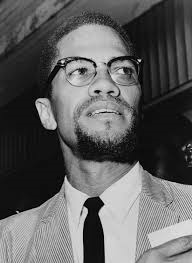H. Grenon, an African American inventor, received U.S. Patent No. 554,867 for a razor stropping device designed to maintain the sharpness of straight razors. His invention contributed to the evolution of personal grooming tools during a time when safety razors had not yet become widely accessible, showcasing Black innovation during the post-Reconstruction era.

Malcolm X participated in a live radio debate with Gordon Hall, a self-proclaimed expert on extremism, just three days before his assassination. The interview grew heated as Hall challenged Malcolm’s views, and during the broadcast, Malcolm X received threats. This exchange marked his final public interview and underscored the intense hostility he faced near the end of his life.
Palmer Hayden, a prominent African American painter associated with the Harlem Renaissance, passed away at the age of 82. Known for his vivid depictions of African American life, folklore, and historical figures, Hayden challenged mainstream artistic norms and celebrated Black identity. His work, including pieces like The Janitor Who Paints and The Baptism, remains influential in American art history.
Toni Morrison, born Chloe Anthony Wofford in Lorain, Ohio, would become one of the most celebrated authors in American literature. She was the first African American woman to win the Nobel Prize in Literature and received the Pulitzer Prize for her novel Beloved, which explores the legacy of slavery and memory. Morrison’s powerful storytelling and contributions to literature have left an enduring impact worldwide.
Paul Revere Williams, the first African American member of the American Institute of Architects (AIA), was born on this day in Los Angeles, California. Known as the “architect to the stars,” Williams designed thousands of buildings, including luxury homes for celebrities and major public structures like the Los Angeles International Airport (LAX) Theme Building. His career broke racial barriers and left a lasting legacy on American architecture.
An institution that would eventually become Morehouse College was founded in Augusta, Georgia. Originally established to educate freedmen and train Black ministers, the school later relocated to Atlanta and became Morehouse College. It has since grown into one of the most prestigious historically Black colleges and universities (HBCUs) in the United States, known for its legacy of leadership, scholarship, and social justice.
As Confederate forces abandoned Charleston near the end of the Civil War, the first Union troops to enter the city included the Twenty-first United States Colored Troops (U.S.C.T.), followed by two companies of the renowned Fifty-fourth Massachusetts Volunteers. Their entry symbolized a powerful moment of liberation, as Black soldiers—many of whom had once been enslaved—marched into a city that had been a central hub of the Confederacy and the transatlantic slave trade.
Four Quakers in Germantown, Pennsylvania, drafted the first recorded formal protest against slavery by an organized white body in English America. Known as the “Germantown Protest,” the document condemned both slavery and the transatlantic slave trade, arguing that it violated Christian ethics and human rights. Though initially set aside, the protest became a foundational moment in American abolitionist thought.
On February 18, 1965, The Gambia gained independence from British colonial rule and became a sovereign nation within the Commonwealth. Dawda Jawara became the country’s first Prime Minister. The day is celebrated annually as National Independence Day, marking a significant milestone in African self-determination and the broader movement of decolonization across the continent.
© 2025 KnowThyHistory.com. Know Thy History